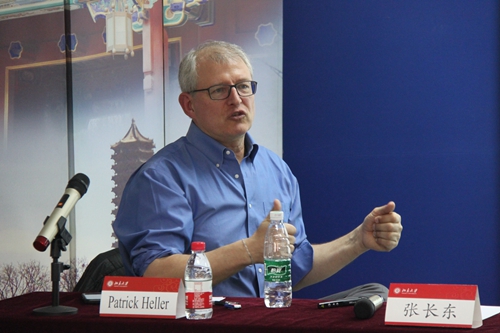Peking University, April 2, 2017: On March 29, Patrick Heller, director of the development research program at the Watson Institute of International Studies and Public Affairs, was invited to deliver a lecture on Urban Governance in the Global South: Growth and Inclusion in the Megacities of Brazil, India and South Africa. The lecture was held at Leo KoGuan Building, Peking University.Students of relevant majors and PKU professors from Co-Innovation Center for State Governance, School of Government, Department of Sociology, PKU–Lincoln Institute and various institutions attended the lecture.
During the lecture, Professor Heller first elaborated on open and democratic urban systems, and the challenges facing cities and developing countries in 21st century. He said that in the age of globalization, megacities in developing countries have become the most contested sites of the socio-spatial contradictions of capitalism. In contrast to deterministic accounts that have dominated literature, combining insights from the developmental status and the urban governance literatures can allow political and institutional factors at the national and local level toshape divergent trajectories of urban transformation.

Heller Delivering the Lecture
By comparing major cities in Brazil, India and South Africa from several aspects including civil rights and civic duties, democratic reforms, decentralization reforms since 1990 and official support for citizen participation, Professor Heller pointed out that there is significant variation in the capacity of cities to coordinate growth and inclusion. He explained that these varied outcomes, on the one hand, are determined by the degree of city capacity and governance autonomy, and on the other hand, by the degree to which the local state is embedded in civil society. However, despite the unbalanced development and pressure from globalization, he believed it is highly possible to achieve ademocratic and inclusive urban governance.
After the speech, Professor Heller held in-depth discussions with the audience, around topics like “how to ensure social stability in India where the urban service is unsatisfactory”, “how society groups may keep their autonomy when collaborating with government”, “the importance of non-government organizations in Brazil” and so forth. The discussion was animated and fruitful.
About the lecturer:
Professor Patrick Heller is a professor of Sociology at Brown University and the director of the development research program at the Watson Institute of International Studies and Public Affairs. His main area of research is the comparative study of social inequality and democratic deepening. He has published numerous books and papers on urbanization, comparative democracy, social movements, development policy, civil society and state transformation.
Written by: You Danqian
Edited by:Wang Qian
